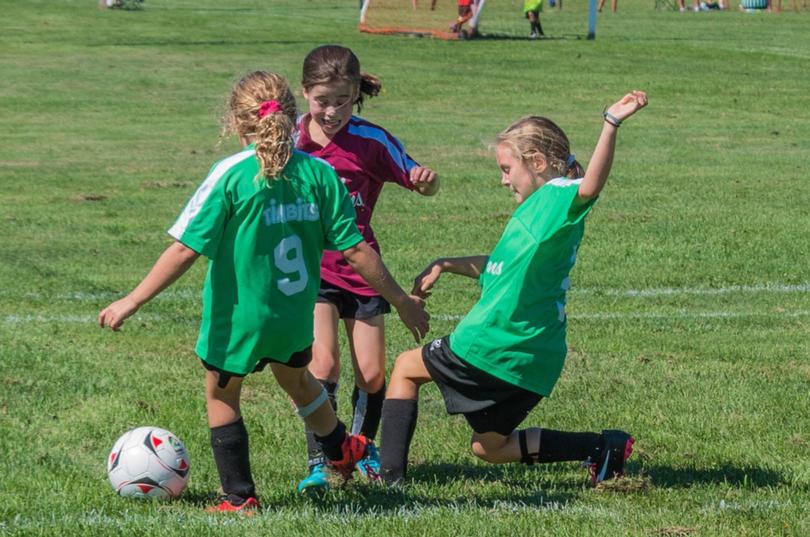KATE EMERY: Participation trophies are just as dangerous now as they were 100 years ago (not at all)
KATE EMERY: Unfashionable as it is, I love participation trophies, actually.

Forget about China — kids’ sporting clubs are keeping Australia’s mining sector in high-vis and steel-caps.
My daughter’s soccer club alone is adding an extra zero to the country’s GDP, going by the number of (solid metal) participation trophies handed out at her end-of-season wind-up. And I’m thrilled.
Unfashionable as it is, I love participation trophies, actually.
Sign up to The Nightly's newsletters.
Get the first look at the digital newspaper, curated daily stories and breaking headlines delivered to your inbox.
By continuing you agree to our Terms and Privacy Policy.Participation trophies don’t teach kids they’re a paragon who deserves a parade for tying their shoes or that last place feels as good as first.
They do teach kids that effort gets rewarded and that no single player, from Kylian Mbappé to that freakishly tall 7-year-old who plays like she came out of the birth canal in soccer boots, can win without a team behind them.
My daughter knows why she got a trophy: she showed up every week, tried her best and stuck it out for the season. Under no illusion that she’s the next Sam Kerr, she sleeps with her trophy and is hanging out for next season.
Similarly, she knows she won her school athletics carnival race a week earlier, even if all the kids got a ribbon.
If the price of getting kids to play sport — with all the benefits that come from both regular exercise in general and team sports in particular — is a trophy then point me towards the Pilbara and I’ll dig up the raw materials myself.
Kids should know what it feels like to lose, on and off the sporting field. Building resilience prepares them for a world in which achievement matters as much as effort.
But just taking part in sport builds resilience. How many kids make it through a season without losing a game? Missing a mark? Botching a pass?
It’s the kids who never make it onto the pitch who don’t know the sting of being slaughtered by the opposition — and still having to shake hands with them and turn up next week to do it all again.

Mocking the generation that came before us is one of the human race’s favourite pastimes and who am I to stand in the way of a good time?
But the fact that millennials get a hard time for being the generation of participation trophies is unfair on a couple of levels.
For one thing, if it were true that we were the first generation to be rewarded just for showing up that’s hardly our fault, so much as the fault of our boomer or gen X parents.
We weren’t the ones out there ordering the trophies and handing them out — we just turned up to (happily) collect them.
It’s also straight-up wrong to assume that participation trophies are a modern invention that came in with mobile phones and Instagram, when they’ve been a thing for more than 100 years.
A US newspaper article from 1922, helpfully scanned online to help people like me win arguments, referenced the Ohio State High School basketball tournament, at which “a participation trophy will also be given to each athlete playing in the series”.
The kids who took home a participation trophy that year might feasibly have grown up to fight in WWII.
So which is it: were they also a bunch of entitled snowflakes or is it possible that are our fears about participation trophies wildly overblown?
I’m inclined to believe the latter, not least because adults enjoy participation trophies all the time and nobody seems to have anything bad to say about that.
In the US the team that loses the Super Bowl — that country’s single biggest sporting event — take home a ring (and a big cheque) for their efforts and nobody goes around calling them entitled losers. (Who would? Have you seen the size of them?)
Participation trophies for kids are no different to the medals handed out to runners in the annual City to Surf run.
We do it not so every middle-aged runner with access to trainers and a Garmin can delude themselves into believing they won but because it feels good to have an achievement recognised, even if that achievement is just making it up Heartbreak Hill without openly weeping.
What matters is not whether kids get a medal or a trophy for turning up but the language we use around them.
Kids don’t need to be told that coming last is the same as coming first: they need to be told that showing up every week and supporting the team is an achievement that’s also worth celebrating.
My soccer-playing daughter, who kicked one goal all season and enthusiastically booted the ball out of bounds more times than I care to count, is unlikely to ever get a nod for best and fairest. But she’s learning that being the best isn’t the only thing that matters.
She’s not going to grow up believing she’s the best at everything she tries. She will grow up believing that showing up and working hard can bring rewards too.
So, please, let’s continue to keep the miners busy and the lights on in the engraving industry by supporting participation trophies for kids’ sports.
And let’s all try to remember that participation trophies for kids today are exactly as dangerous as they were 100 years ago. Not at all.
